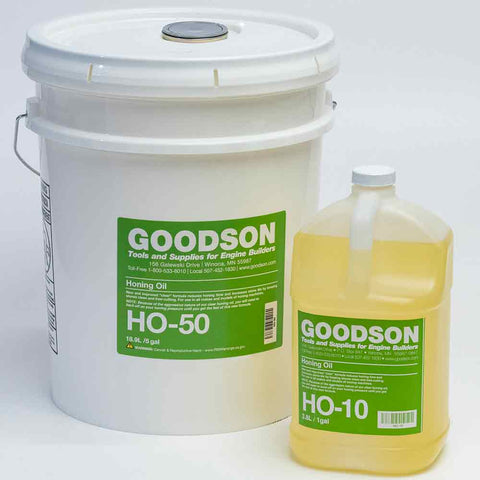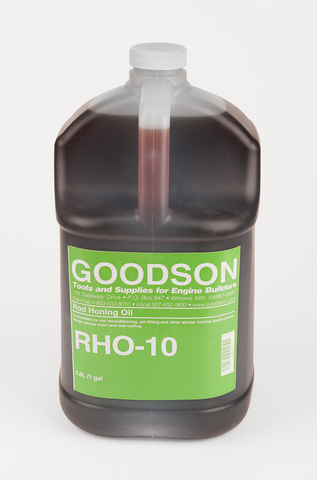The importance of honing oil is often underestimated when calculating the cost of a cylinder honing job. Everyone sees the labor cost and the cost of the abrasive and tooling, but what about the honing oil you use? How does that factor in?
In terms of dollars and cents honing oil is a tiny fraction of the overall cost of cylinder honing; 1% or less of the total process cost. But when it comes to the quality of the job, the rate of abrasive consumption and the speed of the honing cycle, honing oil is king.
We've talked about honing oil before (check out our article, “3 Honing Oils? What's the Difference?" on the Goodson blog) but we're going a little more in depth in this edition of Tech Notes.
Let's start out with the kind of problems the wrong honing oil can cause.
-
Damage to The Honed Surface
Weak honing oil can allow metal chips to weld themselves to the work piece. These pieces are then sheared off which results in a rougher surface finish than is expected for the abrasive you're using. -
Slow Cutting Rates
Using a honing oil with low lubricity or the wrong chemistry will allow the honing abrasive to load with metal chips. This slows the cutting rate, decreasing the machine and operator efficiency and productivity. -
Reduced Abrasive Life
Metal that has embedded itself into the abrasive material can become welded to the surface you’re honing. As it tears away from the stone surface it damages the stone. -
Machine and Tooling Failure
Under-performing honing oil can cause welding between the work piece and your mandrel shoes. This is especially common when honing soft materials such as stainless-steel. When this happens, your honing tools can be ruined, your honing machine can fail, and you’ll have increased waste and lost profits.
Honing Oil serves these important purposes in the honing process.
- Reduces friction and heat when honing
- Washes away metal chips or swarf from the work piece surface, revealing new abrasive grit to maintain cutting action
There are also some guidelines for using Honing Oil that you need to keep in mind. First; use liberal amounts of honing oil. You may think you’re saving money by using a slower flow of oil, but you’re not. You’re actually costing yourself more in the long run due to the potential problems mentioned earlier.
Second; choose the correct honing oil for the material(s) being honed, the tooling and abrasive being used and any known restrictions. Some restrictions you may run into can be environmental in nature and some industries will dictate what can and cannot be included in the honing oil formula. Fortunately, most job shops can use a good quality general purpose honing oil such as Goodson’s Clear Honing Oil (HO-10, HO-50) or Sunnen’s MB-30 Honing Oil.
And that leads us to a brief description of each of the honing oils you can get from Goodson.
Goodson Clear Honing Oil (HO) is a mineral based oil for use with portable hones and all makes of automotive honing machines. It is designed to mix with other brands of mineral based oils such as Sunnen’s options. One of the key things we looked at when formulating this honing oil is that it’s clear. That might not sound like a big deal, but you actually see how much junk you’re accumulating in the hone tank so you can change out filters before they become clogged. This oil is only for vitrified abrasives. Another advantage of this honing oil is its mild odor.
Goodson Rod Honing Oil (RHO) contains additional lubricants that make it ideal for high pressure honing such as connecting rod honing, pin fitting, etc. This brown honing oil is good for honing iron, steel, brass, or bronze. It can also be mixed with other mineral based honing oils. We recommend using this honing oil for deglazing Nicasil cylinders with aluminum-oxide abrasive.
 Goodson Diamond Honing Oil (DHO) is also intended for high pressure honing common when honing valve guides with hard abrasives such as the Goodson Hyper-Finish Diamond Abrasive or Sunnen Diamond Sizing Tool. It is ideally formulated for honing bronze, manganese bronze and other bronze alloys common in valve guides. As with RHO honing oil, the DHO oil contains extra lubricants to allow for faster honing without heat build-up. One caution, do NOT mix it with water-based honing coolants.
Goodson Diamond Honing Oil (DHO) is also intended for high pressure honing common when honing valve guides with hard abrasives such as the Goodson Hyper-Finish Diamond Abrasive or Sunnen Diamond Sizing Tool. It is ideally formulated for honing bronze, manganese bronze and other bronze alloys common in valve guides. As with RHO honing oil, the DHO oil contains extra lubricants to allow for faster honing without heat build-up. One caution, do NOT mix it with water-based honing coolants.

Sunnen® MB-30 Honing Oil is a mineral based honing oil that contains sulfur (a high performance, anti-weld additive) and animal fat. It is a general purpose honing oil being effective for hard steel, stainless steel, carbide, stellite, ceramic, carbon, aluminum, brass, bronze, soft steel and cast iron. It also contains metal deactivators to prevent staining of copper containing alloys.

Sunnen® MAN-845 Honing Oil is formulated to be a general purpose automotive machine shop honing oil. Low viscosity creates less “carry off” which makes cleaning easier after the honing process is complete. This honing oil is petroleum based with mineral oil, sulfur and chlorine additives and is recommended for honing hard steel, aluminum brass, bronze, soft steel and cast iron.

Sunnen® MAN-C Honing Oil Concentrate is intended to be mixed on-site with mineral oil to make a variety of regular strength honing oils, including MAN-845 or CK-50. You can save on shipping costs by purchasing mineral oil locally and mixing it with the MAN-C as needed.

Sunnen® SCC750005 Honing Coolant Concentrate is suitable as a grinding coolant and is superior to conventional honing oils in reducing work piece temperature build up. These formulations do NOT contain mineral oil, sulfur or chlorine. We recommend using SCC750005 when honing cast iron.
As you can see, Goodson offers a wide range of honing oils so it can be tough to choose the right formula. For more information contact the Goodson Tech Services Department and we’ll help you choose the right one for your job.
For more detail, we recommend the article called, “Why Honing Oils Matter” that was published by Performance Machining.
As always, if you have any questions about this or any other technical issue, contact the Goodson Tech Services Department by phone (1-800-533-8010) or email.



